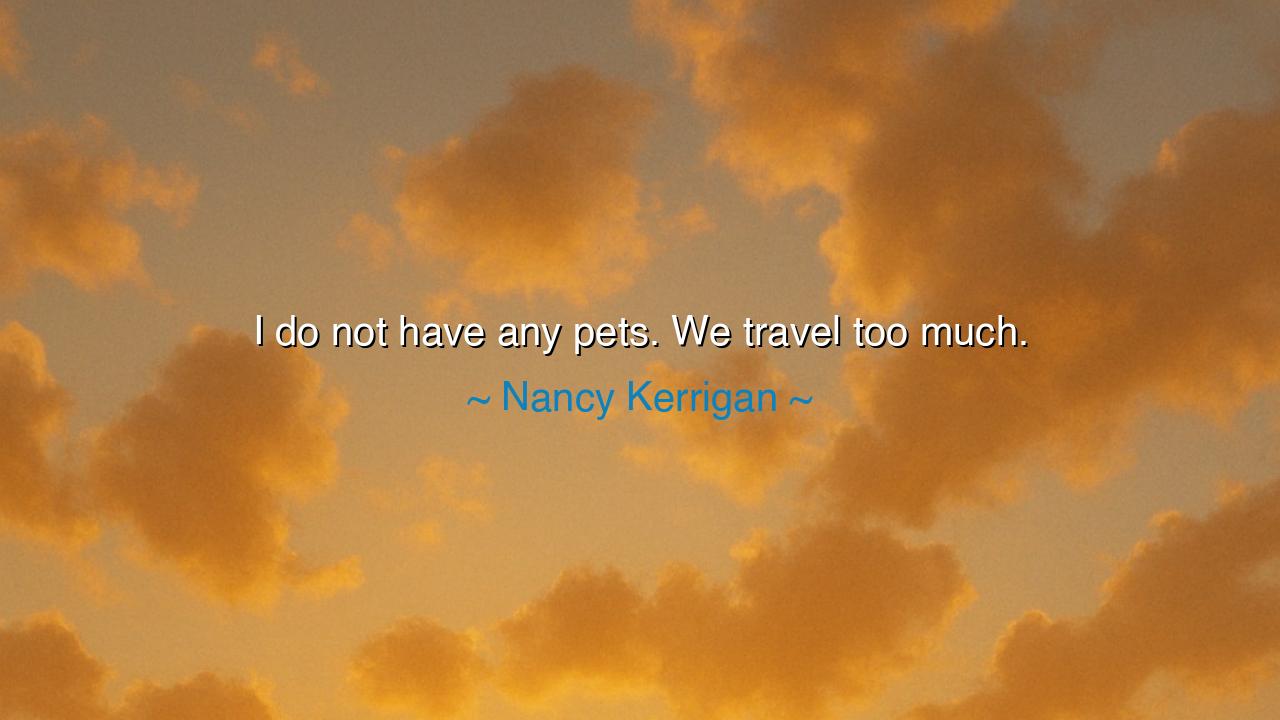
I do not have any pets. We travel too much.






Hear the voice of Nancy Kerrigan, who once declared with simplicity and truth: “I do not have any pets. We travel too much.” At first glance, this seems a plain confession of circumstance, yet within it lies a deeper wisdom about love, responsibility, and the choices that life’s path demands of us. For she speaks not merely of animals, but of the weight of duty, and of the way the restless motion of a life devoted to ambition and calling can sometimes close the door to tender companionship.
The heart of her words lies in the bond of responsibility. A pet is no trinket, no fleeting adornment, but a living soul entrusted to human care. To accept such a companion is to accept the rhythm of daily love: to feed, to shelter, to comfort, to play. Yet Kerrigan, whose life was shaped by the discipline of ice and the demands of travel, recognized that such constancy could not coexist with her endless movement. Better, then, to deny herself the pleasure of pets than to betray the trust of one left lonely. In this, her words shine with honesty: she honors the sacred duty of care by refusing to take it up lightly.
This wisdom echoes the stories of the ancients. Recall the Spartan warriors, who often forsook the comforts of home to dwell in barracks, bound by the demands of war and discipline. Many of them, though they loved their families, could not remain near them, for their lives belonged to the march and the field. So too with Kerrigan: her arena was not war but the rink, yet the principle was the same. A life of travel demands sacrifice, and one of those sacrifices is the gentle companionship that requires presence and stability.
There is also here a truth about the price of excellence. To rise in sport, in art, in any field of great endeavor, one must often surrender comforts that others take for granted. Pets, with their unconditional affection, represent home, rootedness, and stillness. But the life of a traveler is restless, its hearth often cold. Kerrigan’s words remind us that greatness and tenderness often stand in tension, and to embrace one is sometimes to forego the other. This is not weakness, but the reality of human limitation.
Yet her statement also carries a quiet sorrow. For who does not long for the loyal eyes of a dog, the gentle purring of a cat, the steadfast bond of an animal who asks little but gives much? By admitting, “We travel too much,” she reveals not only practicality but perhaps a wistful recognition of what must be left behind. It is the voice of one who knows that every choice in life closes one door even as it opens another. In this way, her words are not merely about pets, but about the universal truth of sacrifice.
The lesson, then, is clear: do not take upon yourself a duty you cannot fulfill. Whether it is a pet, a friendship, or a promise, do not enter lightly, for living beings depend upon you. To abstain is better than to betray. But also recognize that the path of constant movement, of unending ambition, carries its own cost. If you choose such a path, know what you surrender, and accept it with clarity, lest regret weigh too heavily upon your heart.
In practice, learn to weigh your life’s commitments. If you travel much, do not bind yourself to responsibilities that demand your daily presence. Instead, find ways to nurture companionship in forms you can sustain: friends who understand, family you visit when you can, or even brief encounters with animals cared for by others. And when the day comes that the road grows quiet and the travels cease, then perhaps the time will come to embrace the companionship once set aside.
Thus, let Kerrigan’s words be remembered as more than a passing remark. They are a teaching on the balance of duty and desire, on the sacrifices demanded by movement, and on the honesty required to live without false promises. For in the end, love—whether for a pet or a person—demands presence. And to love rightly, one must first live truthfully.






AAdministratorAdministrator
Welcome, honored guests. Please leave a comment, we will respond soon